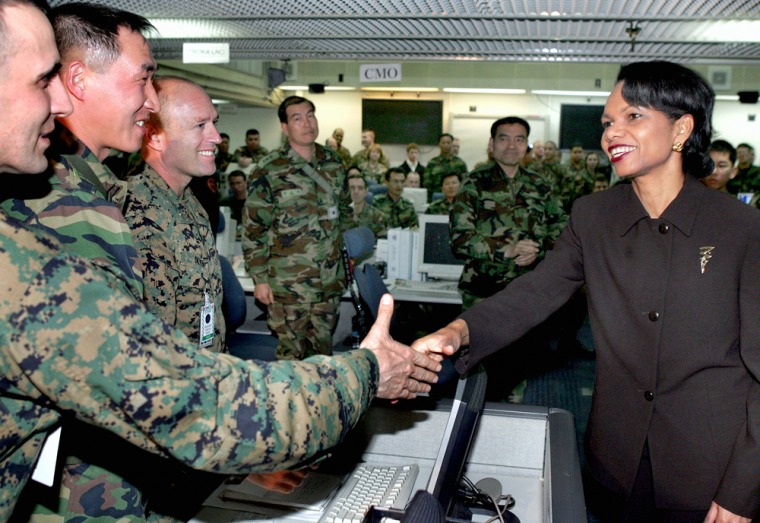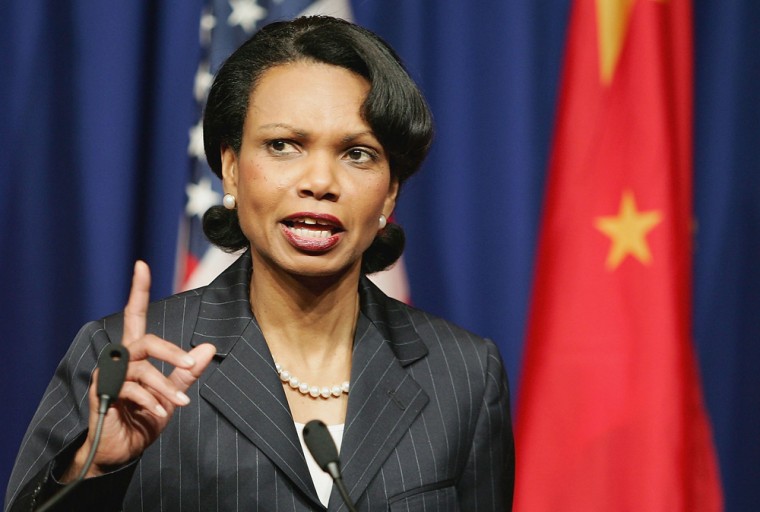Raising the stakes in a standoff with nuclear North Korea, Secretary of State Condoleezza Rice suggested Monday that the Pyongyang government could face international sanctions.
North Korean intentions dominated the closing days of Rice’s weeklong trip to South Asia and East Asia, a tour that involved more difficult face-to-face diplomacy and fewer glamorous front-page newspaper photos than her debut trip to Europe last month.
Six-way arms talks hosted by China have been on hold since North Korea pulled out last year and later declared that it had already built at least one nuclear weapon. None of the countries talking to North Korea has declared the diplomatic process dead, but Rice discussed that possibility during visits to Japan, South Korea and China this past week.
“To the degree that a nuclear-free Korean peninsula gets more difficult to achieve if the North does not (return to the talks) then of course we’ll have to look at other options,” Rice said at a news conference.

The five nations participating in the talks with North Korea are China, Japan, South Korea, Russia and the United States. The structure was intended to make clear to North Korea that its neighbors would not tolerate nuclear weapons on the strategic peninsula.
North Korea test-fired a missile over Japan in 1998, demonstrating Pyongyang’s ability to threaten both Japan and about 50,000 U.S. troops deployed there. Last year, North Korea tested an intercontinental ballistic missile capable of hitting Alaska.
Delivering the message of democracy
In China, Rice delivered an unwelcome message to the communist leadership about U.S. displeasure over heightened tension with Taiwan and made a personal statement about limitations on religious freedom by attending a Palm Sunday church service.
It was the first high-level U.S. visit to China since President Bush pledged to make the spread of democracy a major thrust of his second term. China is further from Bush’s democratic ideal than any nation Rice had visited since taking over from Colin Powell in January.
Rice said she told Chinese leaders that individual liberty and religious freedom can invigorate China as it rapidly develops into a major world economic power.
She also said she asked the Chinese for more help to bring the North Koreans back to the arms talks. China is North Korea’s closest ally, but it is not clear how much leverage Beijing could exert.
North Korea has not responded to a U.S. proposal to trade guarantees of territorial security for an end to nuclear development, and has given no indication it is ready to bargain further.
Rice did not spell out the fallback position, but it could include seeking tough economic sanctions on North Korea through the United Nations Security Council.
“Obviously everyone is aware that there are other options in the international system,” Rice said. The United States has nearly 33,000 troops across the border in South Korea, and is committed to help defend South Korea should the North attack.
China was the last stop on a trip that began with a balancing act over expected sales of U.S. fighter planes to next-door rivals India and Pakistan. Visiting the two countries back to back, Rice faced palpable worries that the United States either ignored their security or territorial concerns or favored the other nation.
Awkward alliance
Meeting Pakistan President Gen. Pervez Musharraf, Rice had the uncomfortable task of embracing an important ally in the battle against terrorism who has also reneged on a promise sought by the United States to give up his command of the armed forces.
Rice celebrated democratic successes in Afghanistan three years after the fall of the hard-line Taliban regime. She rewarded Japan, which has a largely untroubled relationship with Washington, with a clear endorsement of that country’s bid for a permanent seat on the Security Council. She was unable, however, to get a commitment from Japanese leaders to quickly end a costly ban on the import of U.S. beef.
Rice encountered scattered protesters along her motorcade route in Seoul, including one with a banner that read, “Go Home.” The traditionally sound U.S.-Korean relationship has been strained in recent years by resentment over heavy U.S. military presence five decades after active hostilities ended in the Korean War.
